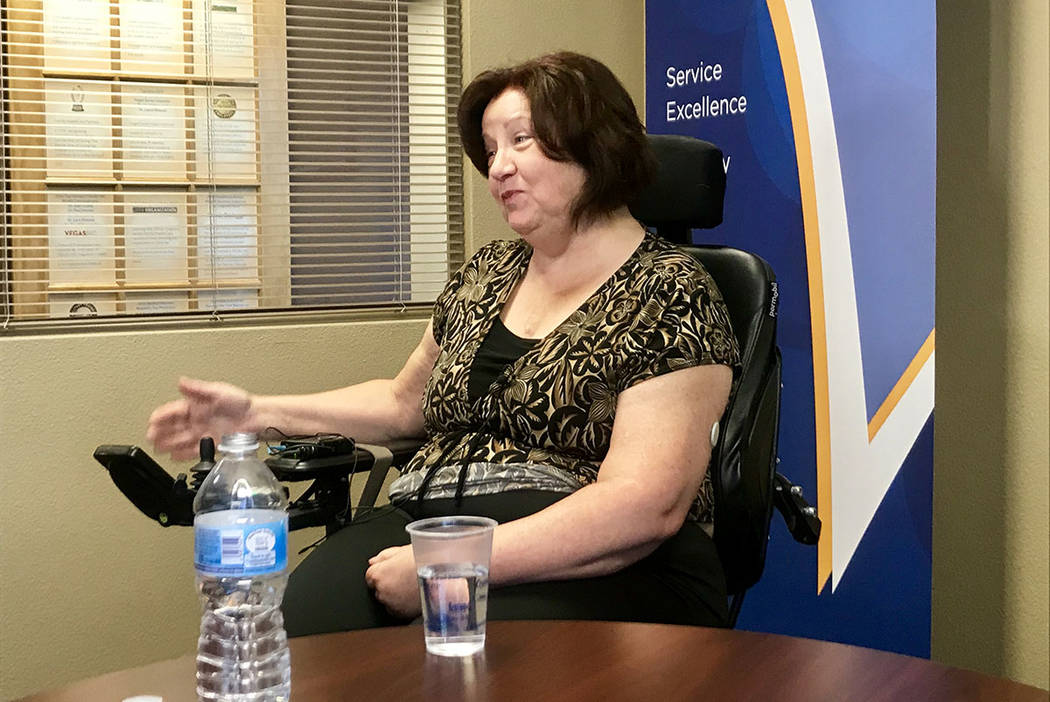National Stroke Awareness Month personal for Las Vegas woman
The first thing Paula Slater did when she noticed the headache was check her blood sugar.
Nothing seemed off, so she drove home and lay down.
Her boyfriend called 911 when he noticed that she had trouble speaking. When emergency medical technicians arrived at her home, they told her she had suffered a stroke.
Seven years later, Slater is a blogger and speaker in Las Vegas who helps others navigate tragedy and loss. She works with survivors and speaks about prevention and how to deal with the aftermath of a stroke, especially during National Stroke Awareness Month in May.
And she does it with a smile and a sense of humor.
“You never appreciate your left arm until you can’t use it. I never even thought of my left arm,” said Slater, who also lost use of her left leg. “So I’ve had a sense of humor, and I’ve nicknamed it Bob, because that’s my ex-husband — just hangs around all day and does nothing.”
She encourages people to change their lifestyle before it’s too late, writing about emotional, physical and financial health on her blog, New Life Now.
“You have to pull the trigger today and change your habits. That’s the key to longevity and not living with regret,” Slater said.
Dr. Jud Fisher said there are two common types of strokes. Slater suffered a hemorrhagic stroke, which is caused by blood vessels rupturing in the brain and increasing pressure in her skull. The second type of stroke is ischemic, when blood supply to an area of the brain is cut off due to a blood clot.
“And depending on which area of the brain is affected, that determines what our deficit will be,” the Las Vegas doctor said. “So if it affects the motor strip where the arm and leg is affected on one side of the brain, on the right side of the brain it’s going to affect the left side.”
When someone is having a stroke, they may not be able to speak or think clearly enough to ask for help, Fisher said, but bystanders can recognize the symptoms to know what to look for.
Fisher said FAST is a mnemonic device used to identify signs of a stroke as quickly as possible: facial droop, arm weakness and speech difficulty. The T is for talk to emergency services immediately.
“Sooner the better — time is brain tissue,” Fisher said. “We want to identify it very, very early and get the patient to an emergency facility that can handle the stroke.”
Two-thirds of people who suffer strokes are 65 or older, but younger people are also at risk.
Risk factors include diabetes like Slater has, high blood pressure, high cholesterol, tobacco smoking and irregular heartbeat.
Younger people who suffer strokes may have heart defects or other pre-existing conditions that can lead to blood clots.
Fisher also recommends lifestyle changes to decrease the risk of stroke.
“The ones we’re going to talk about in terms of trying to reduce your risk of stroke apply to virtually every chronic disease state that Americans suffer from, and they’re shockingly simple,” he said.
First: Get at least seven hours of sleep per night, he said. Studies by the American College of Cardiology have shown that lack of sleep is tied to the risk for heart attack and stroke.
“And if I was gonna say the one single thing that people could do that would make the greatest effect on their life for reducing cardiovascular events, if I only had one thing, it’s walking,” he said.
Walking for at least 30 minutes per day, five days per week, can dramatically reduce the risk of heart attack and stroke, Fisher said, especially in seniors. It’s as close to a panacea as you can get.
Eating well-balanced, nutritious meals and not smoking also reduce the risk of stroke.
“The message I would take to people,” Slater said, “is to take care of your brain and your entire body like the incredible piece of machinery that it is.”
Contact Max Michor at mmichor@reviewjournal.com or 702-383-0365. Follow @MaxMichor on Twitter.


















